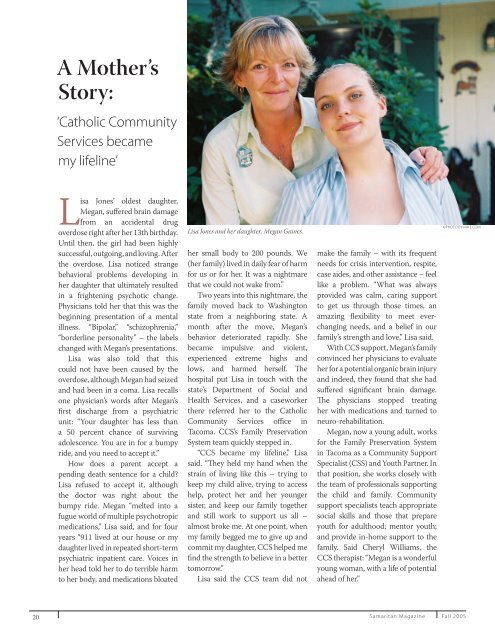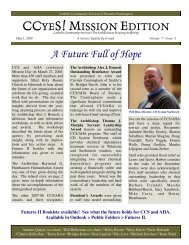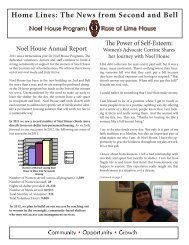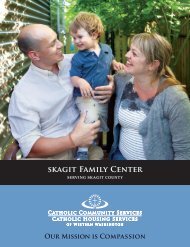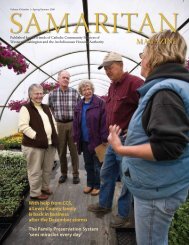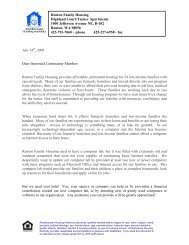Affordable Housing - Catholic Community Services
Affordable Housing - Catholic Community Services
Affordable Housing - Catholic Community Services
You also want an ePaper? Increase the reach of your titles
YUMPU automatically turns print PDFs into web optimized ePapers that Google loves.
A Mother’s<br />
Story:<br />
‘<strong>Catholic</strong> <strong>Community</strong><br />
<strong>Services</strong> became<br />
my lifeline’<br />
Lisa Jones’ oldest daughter,<br />
Megan, suffered brain damage<br />
from an accidental drug<br />
overdose right after her 13th birthday.<br />
Until then, the girl had been highly<br />
successful, outgoing, and loving. After<br />
the overdose, Lisa noticed strange<br />
behavioral problems developing in<br />
her daughter that ultimately resulted<br />
in a frightening psychotic change.<br />
Physicians told her that this was the<br />
beginning presentation of a mental<br />
illness. “Bipolar,” “schizophrenia,”<br />
“borderline personality” – the labels<br />
changed with Megan’s presentations.<br />
Lisa was also told that this<br />
could not have been caused by the<br />
overdose, although Megan had seized<br />
and had been in a coma. Lisa recalls<br />
one physician’s words after Megan’s<br />
first discharge from a psychiatric<br />
unit: “Your daughter has less than<br />
a 50 percent chance of surviving<br />
adolescence. You are in for a bumpy<br />
ride, and you need to accept it.”<br />
How does a parent accept a<br />
pending death sentence for a child<br />
Lisa refused to accept it, although<br />
the doctor was right about the<br />
bumpy ride. Megan “melted into a<br />
fugue world of multiple psychotropic<br />
medications,” Lisa said, and for four<br />
years “911 lived at our house or my<br />
daughter lived in repeated short-term<br />
psychiatric inpatient care. Voices in<br />
her head told her to do terrible harm<br />
to her body, and medications bloated<br />
Lisa Jones and her daughter, Megan Gaines.<br />
her small body to 200 pounds. We<br />
(her family) lived in daily fear of harm<br />
for us or for her. It was a nightmare<br />
that we could not wake from.”<br />
Two years into this nightmare, the<br />
family moved back to Washington<br />
state from a neighboring state. A<br />
month after the move, Megan’s<br />
behavior deteriorated rapidly. She<br />
became impulsive and violent,<br />
experienced extreme highs and<br />
lows, and harmed herself. The<br />
hospital put Lisa in touch with the<br />
state’s Department of Social and<br />
Health <strong>Services</strong>, and a caseworker<br />
there referred her to the <strong>Catholic</strong><br />
<strong>Community</strong> <strong>Services</strong> office in<br />
Tacoma. CCS’s Family Preservation<br />
System team quickly stepped in.<br />
“CCS became my lifeline,” Lisa<br />
said. “They held my hand when the<br />
strain of living like this – trying to<br />
keep my child alive, trying to access<br />
help, protect her and her younger<br />
sister, and keep our family together<br />
and still work to support us all –<br />
almost broke me. At one point, when<br />
my family begged me to give up and<br />
commit my daughter, CCS helped me<br />
find the strength to believe in a better<br />
tomorrow.”<br />
Lisa said the CCS team did not<br />
make the family – with its frequent<br />
needs for crisis intervention, respite,<br />
case aides, and other assistance – feel<br />
like a problem. “What was always<br />
provided was calm, caring support<br />
to get us through those times, an<br />
amazing flexibility to meet everchanging<br />
needs, and a belief in our<br />
family’s strength and love,” Lisa said.<br />
With CCS support, Megan’s family<br />
convinced her physicians to evaluate<br />
her for a potential organic brain injury<br />
and indeed, they found that she had<br />
suffered significant brain damage.<br />
The physicians stopped treating<br />
her with medications and turned to<br />
neuro-rehabilitation.<br />
Megan, now a young adult, works<br />
for the Family Preservation System<br />
in Tacoma as a <strong>Community</strong> Support<br />
Specialist (CSS) and Youth Partner. In<br />
that position, she works closely with<br />
the team of professionals supporting<br />
the child and family. <strong>Community</strong><br />
support specialists teach appropriate<br />
social skills and those that prepare<br />
youth for adulthood; mentor youth;<br />
and provide in-home support to the<br />
family. Said Cheryl WiIliams, the<br />
CCS therapist: “Megan is a wonderful<br />
young woman, with a life of potential<br />
ahead of her.”<br />
©PHOTO BY MIKE.COM<br />
20 Samaritan Magazine Fall 2005


